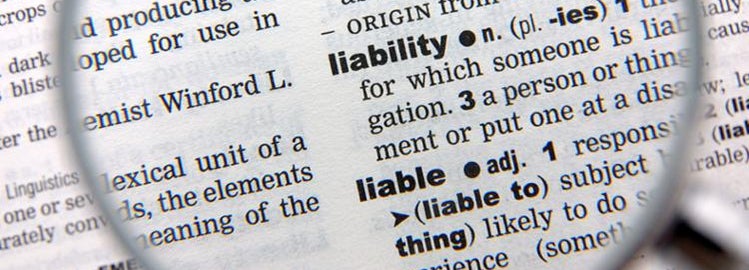Defining Every Liability Insurance Term You Should Know

Liability insurance comes in many forms, but the two main categories are personal liability and commercial liability coverage. In its simplest form, liability insurance protects the policyowner against lawsuits stemming from injury or damage sustained by another person. A liability insurance policy can help pay for medical bills, repair or replace property that was damaged, and assist the policyholder in paying legal fees due to a court battle. There are several key terms that are frequently found in liability insurance documents and it is important to understand what they mean.
Release of Liability Statement: Sometimes called a liability waiver. Signing a release of liability statement means that you give up the right to sue if any loss results from participation in an activity. It is an express assumption of risk where the participant acknowledges the nature of the activity and the risks involved, and chooses to voluntarily accept those risks.
Civil Liability Insurance: This is a type of policy that is purchased to provide coverage for provisions under civil law. This kind of insurance is available in many European countries. France requires anyone staying for an extended period to carry a civil liability insurance policy.
Third-Party Liability Insurance: This coverage helps pay for damages, losses or injuries that may be inflicted upon another party as a result of the actions of the policyholder. It is referred to as third-party liability insurance because the coverage deals with the well-being of parties other than those covered by the policy or the insurance company. You are the first party. The insurance company is the second party. The person who was injured or experienced property damage is the third party.
Tort Liability Insurance: This type of insurance protects the policyowner against claims for wrongfuls act or infringement of rights leading to civil legal liability, for which the courts could demand payment. Some states require student teachers to carry tort liability insurance, because they are not technically employees of the district and therefore are not covered under the school's insurance policies.
Short-Term Liability Insurance: Sometimes called special events liability coverage, the purpose of this coverage is protect the host or event organizer for one-time events lasting a short time. These policies generally limit the number of guests who can attend the event and may include other stipulations as well. Examples may include an outdoor concert, a charity auction or a community sporting event.
Self-Employed Liability Insurance: These policies are for individuals who run their own businesses, but do not have any employees. Depending on the type of employment, this kind of policy could take many forms. A consultant may want professional liability insurance, while a computer repair person may need a general liability insurance policy.
Liability Insurance Certificate: This is a one-page document that summarizes the benefits of an insured party's policy. It is proof of the insurance coverage and limit of the policy. Contractors and subcontractors often must produce a liability insurance certificate before being accepted on bids for jobs.
Trustee Liability Insurance: A trustee is charged with safeguarding assets or monies left to an individual and making certain that these assets are used according to the wishes of the person who set up the trust. Beneficiaries sometimes disagree with their trustee as to what constitutes good management or timely dispersal of those assets, and when they do, they may file a lawsuit. Trustee liability insurance protects the trust manager from the costs associated with being sued.
Individual Liability Insurance: Sometimes called personal liability coverage, this type of policy covers a single person rather than a group of people or a business.
Sole Proprietorship Liability Insurance: A sole proprietorship is an unincorporated business owned and run by one individual with no distinction between the business and the owner. As such, this type of commercial liability insurance policy covers both the owner and his or her business actions.
Liability Deductible: Commercial liability insurance policies sometimes, but not always, include a deductible that the policyowner must pay before the insurance company pays anything toward a claim. A liability deductible is usually based on a percentage of the claim. For example, if a policy's deductible is 10% and the claim is $25,000, the policy owner would pay $2,500 and the insurance company would pay the remaining $22,500.
Vendor Liability Insurance Coverage: This type of coverage may be included in a commercial liability insurance policy, or it may need to be purchased separately. It is intended to protect those who temporarily sell their goods or services as vendors at art festivals or farmers markets, for example.
Private Liability Insurance: Another name for personal liability insurance, this type of coverage is for individuals or groups with non-commercial needs.
Personal Liability Protection: This refers to what a liability insurance policy offers the owner -- protection against financial losses stemming from a lawsuit or claim.
Personal Liability Policy: This refers to any insurance policy or part of an insurance policy (such as your homeowners or auto insurance) that includes liability coverage for individuals. It can help pay for medical bills due to injuries, repair or replace property that was damaged, and help pay for court fees should the policyowner face a lawsuit.
Personal Catastrophe Liability: This type of insurance offers a higher level of liability protection over and above your homeowners and auto insurance policies. It is intended to protect the policy owner from major losses stemming from a severe injury or property damage that may far exceed the limits of traditional liability policies.
Limited Liability Release: A contract in which the injured party agrees to give up certain legal claims in exchange for payment of money.
Host Liability Insurance: Sometimes called host liquor liability insurance, this offers protection for event organizers against bodily injury or property damage resulting from serving or distributing alcoholic beverages by a party not engaged in this activity as a business enterprise. For example, a wedding host may want this type of policy if they will be serving alcohol to the guests.
Full Liability Insurance: Often called "full coverage" car insurance, this is in reference to having a complete policy that includes liability as well as collision coverage. It helps pay not only for injuries and damages to third parties, but also for repairs to the policyholder's vehicle.
Comprehensive Liability: A type of commercial insurance that is sometimes called general liability, this is a broad policy that protects the organization from liability claims related to products coverage, completed operations coverage, premise and operations coverage, and independent contractors coverage.
Band Liability Insurance: This coverage protects musicians and other performing artists from lawsuits stemming from injuries or property damage caused at concerts or shows.
1099 Liability Insurance: This is a form of general liability commercial insurance coverage for independent contractors. Potential clients may require any contractor they do business with to carry a 1099 liability insurance policy.
Third-Party Liability Form: This is the document that is filled out to make a liability insurance claim. It includes information on the first party (the insured); the second party (the insurance company); and the third party (the injured person).
Primary Liability Coverage: The basic insurance coverage that covers injuries or damage to other people or property if you're at fault for an accident. When it comes to personal liability coverage, this a term used in auto insurance claims where both drivers are covered, but only one of the insurance companies is used to file a claim. For commercial purposes, this term is used to differentiate between a contractor (primary liability) and a subcontractor (secondary liability).
Personal Excess Liability Coverage: Sometimes called "umbrella insurance," this provides liability protection over and above your other personal liability insurance limits such as those on your homeowners or auto insurance policies.
Liability Work Insurance: A form of commercial liability insurance that protects you, your business and your employees from claims involving bodily injury or property damage, up to the limits of your policy.
Group Liability Insurance: This type of coverage is for boards of directors of non-profit groups or commercial businesses. It protects the members of these boards from lawsuits stemming from their decisions.
